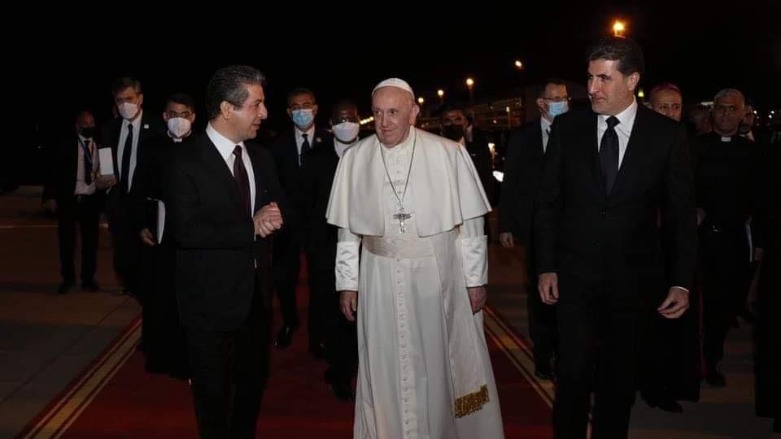The roots of coexistence and religious tolerance in Kurdistan

Kurdistan has a long history of coexistence and religious tolerance not seen in other parts of the region. Kurds themselves adhere to different religions, with people practicing different faiths often living in the same village or town, and religious tolerance is deeply rooted in the country.
Historically, Kurds have followed many religions, from Mithraism in the Roman Empire era to the ancient Zoroastrian faith, the religion of the Yezidis, Yarsanism, Judaism, Christianity, and different sects of Islam, including the young Bahaʼi faith.
The Kurdish people and the people of Kurdistan celebrated their freedom of practice, social harmony, religious tolerance, coexistence and cultural diversity. After the Muslim conquest of the 7th Century and during the Safavid and Ottoman Empires that lasted from the 16th into the 20th Century, ethnic and religious minorities faced systematic persecution and discrimination.
Soran Hamarash, a renowned Kurdish historian and author of the book “Kurd Keye,” (Who are the Kurds) argues that there have been many religions in Kurdistan. He wrote that there is documentary evidence suggesting Kurds practiced Mithraism, making it one of the oldest religions practiced by the Kurds.
Hamarash also says that religion has been used in Iraq to further ethnic hegemony and domination at the expense of minorities. Such oppression has led to minority groups turning against each other, according to Hamarash, and has led to genocide and demographic change.
Despite the challenges of foreign influence, religious tolerance and coexistence have solid footing in the area known as Kurdistan to this day.
The Kurdistan Regional Government itself promotes tolerance and religious pluralism. The region’s officials reject the use of the word “minority” to describe ethnic and religious groups, instead preferring to refer to them as components – essential and equal members of society.
In 2015, parliament passed a law providing for political and cultural rights for minority groups in the Kurdistan region.
This culture of acceptance and diversity has been seen more clearly in the post-Saddam era, as religious and ethnic groups are increasing in number in the Kurdistan Region unlike anywhere else in the Middle East.
Arguably the increase in the number of religious minorities is for two different reasons: First, the efforts of government and non-governmental organizations and the laws that protect their rights mean that people do not have to seek refuge outside. Second, waves of migrants from Iraq and the disputed territories have brought more minority communities to the Kurdistan Region.
According to the US Institute of Peace, the Iraqi government has failed to protect religious and ethnic minorities from violence, leading to their displacement.

There are more than 787,000 registered displaced Iraqis in the Kurdistan Region, of which about 40 percent are Yezidis, Christians, or other religious and ethnic minorities, accounting for a one-fifth increase in the Kurdistan Region’s population.
Ethnic and religious communities faced many atrocities in post-colonial Iraq, beginning with the violent pogrom of the Jews, known as Farhud, in the 1940s, and genocide of the Kurds in the infamous Anfal campaigns of the 1970s and 1990s.
The Christians of Iraq have faced violence as well, targeted in a series of attacks that forced them to flee to the Kurdistan Region or leave the country altogether. As a result their numbers have declined rapidly in Iraq, falling more than 80 percent since 2003.
Yezidis, a group indigenous to Kurdistan, faced their own genocide at the hands of ISIS. The Yezidis who did not manage to flee to the Kurdistan Region were subjected to mass killings, rape, and sexual enslavement. Many Yezidis and Christians live in territory now disputed between the KRG and federal Iraq, and roughly 10,000 of them were either killed or kidnapped by ISIS in Sinjar and other disputed areas.
Evan Jani Gorbeel, a Christian Assyrian from the Soran district and president of the Kherota Organization for Human Rights, said that the people of Kurdistan are by their nature tolerant and they have lived for thousands of years. Christian and Muslim Peshmerga, for example, have fought and bled together throughout various uprisings, he told Kurdistan 24.
Gorbeel said it was evident the Kurdistan Region was the only safe place for religious minorities in Iraq, calling its religious plurality “the most vital success of the Kurdistan Region’s government,” and “something that they should be proud of.”
He believes that education is the best way to ensure the culture of tolerance survives, and that people in the region should learn about its diverse history in school, cultural centers, and through civil society. Coexistence, he argued, could be jeopardized if the government, political parties, and international organizations do not facilitate conditions for more involvement of the youth in jobs. Failure to do so, he said, may cause an increase in immigration in the coming years, but for economic reasons rather than intolerance.
